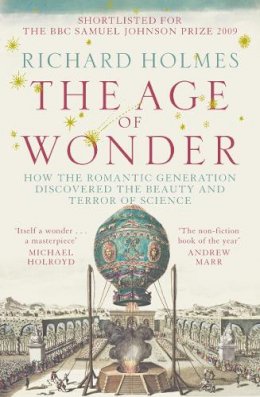27%OFF
Stock image for illustration purposes only - book cover, edition or condition may vary.
The Age of Wonder: How the Romantic Generation Discovered the Beauty and Terror of Science
Richard Holmes
FREE Delivery in Ireland
Description for The Age of Wonder: How the Romantic Generation Discovered the Beauty and Terror of Science
Paperback. Shortlisted for the Samuel Johnson Prize and winner of the Royal Society Prize for Science Books, Richard Holmes's dazzling portrait of the age of great scientific discovery is a groundbreaking achievement. Num Pages: 380 pages, Illustrations (chiefly col.), map, ports. (chiefly col.). BIC Classification: 3JF; PDX. Category: (G) General (US: Trade). Dimension: 197 x 128 x 37. Weight in Grams: 442.
Shortlisted for the Samuel Johnson Prize and winner of the Royal Society Prize for Science Books, Richard Holmes’s dazzling portrait of the age of great scientific discovery is a groundbreaking achievement.
The book opens with Joseph Banks, botanist on Captain Cook’s first Endeavour voyage, who stepped onto a Tahitian beach in 1769 fully expecting to have located Paradise. Back in Britain, the same Romantic revolution that had inspired Banks was spurring other great thinkers on to their own voyages of artistic and scientific discovery – astronomical, chemical, poetical, philosophical – ... Read morethat together made up the ‘age of wonder’.
In this breathtaking group biography, Richard Holmes tells the stories of the period’s celebrated innovators and their great scientific discoveries: from telescopic sight to the miner’s lamp, and from the first balloon flight to African exploration.
Show Less
Product Details
Publisher
HarperCollins Publishers
Place of Publication
London, United Kingdom
Shipping Time
Usually ships in 4 to 8 working days
About Richard Holmes
Richard Holmes is a Fellow of the British Academy, and was Professor of Biographical Studies at the University of East Anglia (2001–2007). He was awarded the OBE in 1992. His first book, ‘Shelley: The Pursuit’, won the Somerset Maugham Prize in 1974. ‘Coleridge: Early Visions’ won the 1989 Whitbread Book of the Year Award, and ‘Dr Johnson and Mr Savage’ ... Read morewon the James Tait Black Prize. ‘Coleridge: Darker Reflections’ won the Duff Cooper Prize and the Heinemann Award. He lives in London and Norfolk with the novelist Rose Tremain. Show Less
Reviews for The Age of Wonder: How the Romantic Generation Discovered the Beauty and Terror of Science
‘Rich and sparkling, this is a wonderful book.’ Claire Tomalin, Guardian, Books of the Year ‘Exuberant…Holmes suffuses his book with the joy, hope and wonder of the revolutionary era. Reading it is like a holiday in a sunny landscape, full of fascinating bypaths that lead to unexpected vistas…it ... Read moresucceeds inspiringly.’ John Carey, Sunday Times ‘Thrilling: a portrait of bold adventure among the stars, across the oceans, deep into matter, poetry and the human psyche.’ Peter Forbes, Independent ‘A glorious blend of the scientific and the literary that deserves to carry off armfuls of awards and confirms Holmes's reputation as one on the stellar biographers of the age.’ Dominic Sandbrook, Daily Telegraph, Books of the Year ‘No question – the non-fiction book of the year is Richard Holmes's “The Age of Wonder”, not only beautifully written, but also kicking open a new perspective on the Romantic age.’ Andrew Marr, Observer, Books of the Year ‘Itself a wonder – a masterpiece of skilful and imaginative storytelling.’ Michael Holroyd, Guardian, Books of the Year ‘Dazzling and approachable. It's a brilliantly written account…original in its connections and very generous in its attention.’ Andrew Motion, Guardian, Books of the Year ‘Witty, intellectually dazzling and wholly gripping.’ Richard Mabey, Guardian, Books of the Year ‘So immediate and so beguiling is Holmes's prose that we are with him all the way.’ Sunday Telegraph ‘Brimming with anecdote, Holmes's enthusiastic narrative amply conveys the period's spirited, often reckless pursuit of discovery with an astute balance of technical detail and the wider cultural picture.’ Financial Times Show Less

